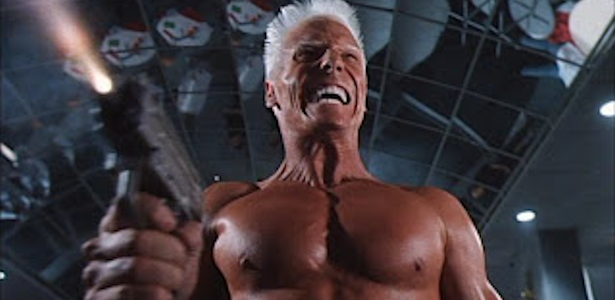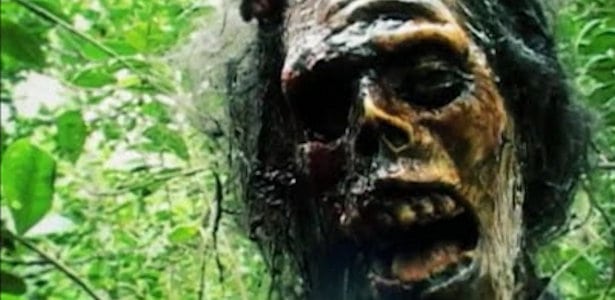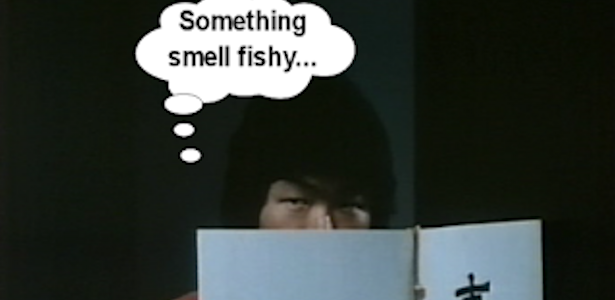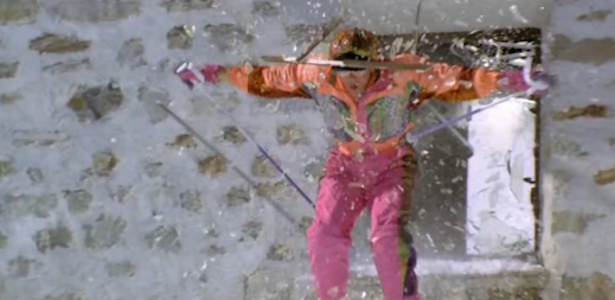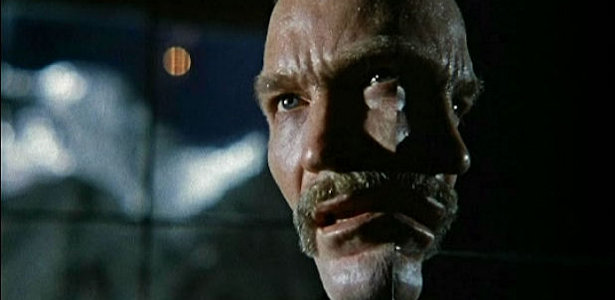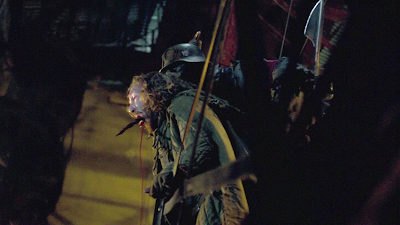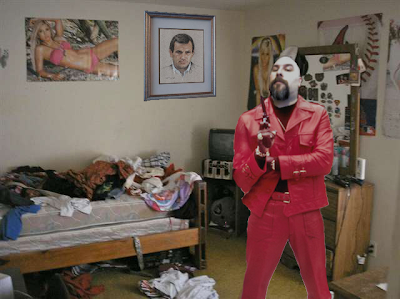 |
| A rare peek into the VJ crib |
You know that saying, "there's no fan like a new fan?" Oh yeah, probably not, I just made it up. You know how those new horror fans are, don't ya? Every new horror movie is just awesome and they consider themselves "horror movie experts" because they've seen almost all of the FRIDAY THE 13th films and have a home-made Freddy Kruger glove.
I've seen David Janssen in a few things here and there over the years, but I never really took much notice until recently when Will got me to track down a copy of THE GOLDEN GATE MURDERS, a film that proper Janssen fans probably have on a shelf behind a box of stale crackers, underneath that jar of unlabeled homemade red-pepper jam that was given to them as a gift from a relative that they still haven't found a use for. For me it was a revelation. Not only was Janssen looking old enough to be as crusty and cranky as he acted, but it reinforces my time honored idiom: You can't make a bad movie in San Francisco. It's just not possible. Don't argue! Can't be done! (prior to 1990)
Anyway, here are a couple of the Janssen films I've enjoyed during my new-found fanship (that's a word!). ...and yes, that is Will (a Janssen fan since he was old enough to pee standing) facepalming in the corner. Don't mind him, he'll get over it.

THE GOLDEN GATE MURDERS (1979): One short year before his untimely death, CBS pulled in the hard working and hard living TV favorite David Janssen to play a crusty San Francisco Detective in this TV movie movie that defies all odds. A group of priests and nuns (including Kenneth Tigar of PHATASM II fame) arrive in SF only to find that Father John Thomas (*snicker*) has a keen fascination with the Golden Gate Bridge. As they are driving into the city, he insists on stopping on the surprisingly traffic and wind-free bridge so he can walk across. For some unseen reason Father Thomas plummets to his death over the side. The coroner rules it a suicide, but Sister Benecia (Susannah York) is convinced that it wasn't. The cops sort of look into it, but decide to close the case. Our perky penguin ain't havin' it and pesters the SFPD so much that they decide to give her their loose-cannon trouble-maker Detective Silver (Janssen) so that she will give up and go back to her nunnery. They figure if anyone can alienate her, he can! As you can easily predict, their partnership is a grudging one of stumbling over clues and knee-jerk leaps of non-logic (the guy who is in an asylum must be the killer... because he's crazy! No thanks to his overtly agressive doctor). After a bit their relationship warms to the point where Silver shows his affection for Benecia and introduces her to the city by sharing massive platters of bagels and lox and teaching her how to make a sandwich out of them. Bagels. In
San Francisco!
First off SF is infamous for having slim to none by way of proper Jewish delis (David's has been down on Geary since the dawn of time and is not just an atrocious excuse for a Jewish deli, but for any sort of eating establishment), secondly SF is quite famous for it's oysters and what are oysters famous for? Yes, exactly! How this escaped the writer's feeble grasp I'll never know. I'm guessing CBS' head offices in NY hired a local writer who had clearly never been to SF. As it turned out very little of the cast did either, as much of the movie is interiors or hilariously cramped sets dressed up to look like 10' sections of the bridge. That said, they do shoot the leads on location at a couple of landmarks including Coit Tower and the Japanese Tea Garden.
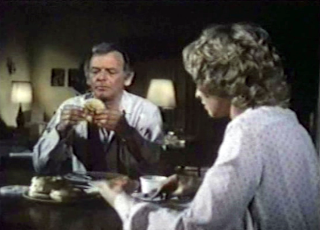 |
| David Janssen turns on the romance! |
The movie has so many wonderfully odd little bits, from scenes that are funny (though somewhat sad) such as a bit with Janssen discussing possible causes of the priests death while appearing to be completely hammered, to the coroner's steadfast refusal to see the most obvious clues and connections to similar deaths. Other great moments include some references to Detective Silver's cat "Dirty Harry", and the a romantic encounter in the commissary section of an airliner that involves handcuffs and a nun's habit!
Directed by Walter Grauman, also responsible for "Crowhaven Farm" (1970) and scores of episodes of "The Streets of San Francisco" and "Barnaby Jones", and written by first time TV writer David Kinghorn, the movie meanders all over the place, but mostly building the relationship between Detective Silver and Sister Benecia only occasionally remembering that there is a possible murder to perhaps solve. Even so, as Will said, this is a movie that is "a lot better than it has any right to be."

MACHO CALLAHAN (1970): I'll be honest I do enjoy the occasional "clean" western starring, the even less imitable as the years go on, John Wayne, but what I really love are Westerns that de-glamorize the genre. In the early '60s westerns were still pretty clean affairs with good guys and the bad guys, a woman to fight over and righteousness to prevail. By the early '70s assassination, war and corruption had permanently altered the idealism of the public and nowhere was that reflected more than in the western.
Opening with what is quite possibly one of the most gritty, nasty visions of prison hell ever to be portrayed in a western, Janssen here plays Diego "Macho" Callahan, a gunslingin' criminal who was incarcerated, not for killin' or stealin', but for refusing to join the confederate army. After a violent escape, Callahan finds himself in his home town with his partner Juan (Pedro Armendáriz Jr.) setting up a plan to hunt down the yellow-shod sleazebag who turned him in (Lee J. Cobb). While in the process of doing that, he cruelly guns down a newly wed soldier (David Carradine) who lost an arm in the war, over a bottle of champagne. While the law considered it a fair fight, the soldier's widow (Jean Seberg) does not and places a massive bounty on Callahan's head. Add in the fact that the army wants to nail his ass for breaking out of prison, and suddenly everyone wants Callahan's hide.


This may seem like a simple enough premise for a western, but it is surprisingly complex. Every time I though I had the movie figured out and I knew where it was going, I found myself clinging on by my fingertips as the movie takes a sharp left turn at 40 miles an hour (hey, that's fast! A horse can only manage about 15 mph). In addition to all of the switchbacks in the plot, the movie features a fantastic cast, including James Booth as a deadly dandy, Bo Hopkins as smitten kid who is itchin' to get dead, plus Richard Anderson, Diane Ladd and Matt Clark in bit parts. Of whom, absolutely none are at all likable. Callahan's world is populated entirely by selfish, cruel and dangerous people covered in filth and blood. John Ford this ain't. In spite of the fact that the character's are unlikable, I never hated them and they never annoyed me. They aren't unlikable in an irritating, over-played way, like so many generic horror films these days. Also unlike modern films, you can actually see these bastards thinking about how to be bastards. The scene where Callahan confronts Duffy (Lee J. Cobb) in the middle of a crowd during a horse-shoe championship is verging on brilliant. They both talk around the subject but you can see Callahan's gears grinding and Duffy slowly realizing that he is caught like a rat in a trap. The subtleness of scenes like these and little interesting character touches are an excellent counterpoint to the nastiness of the film over all.

Many have criticized the rather abrupt change in tone in the final act, and whether that was studio intervention to make him someone the audience could root for in the end or maybe the screenwriter's intent to finally soften Callahan to allow him to have grown as a human by the conclusion, I'm not sure. It is pretty jolting and arguably the film's only real misstep. Also jolting is how Seberg's volatile character seems to mirror (though presumably exaggerated) her real life issues with men, or at least her claims of violent clashes with her lovers and husbands. The scene where she tries to kill Callahan with a poker leading to a brutal and bloody fight in a small cabin is so intense even by today's standards, it must have been utterly shocking back in 1970.
If you are looking for chest-thumping heroics and simple icons of justice and might, you are in the wrong territory amigo. However, if you dig the subversive, cynical and complex westerns of the revisionist era with a great American cast, this is your ticket to ride shotgun.




